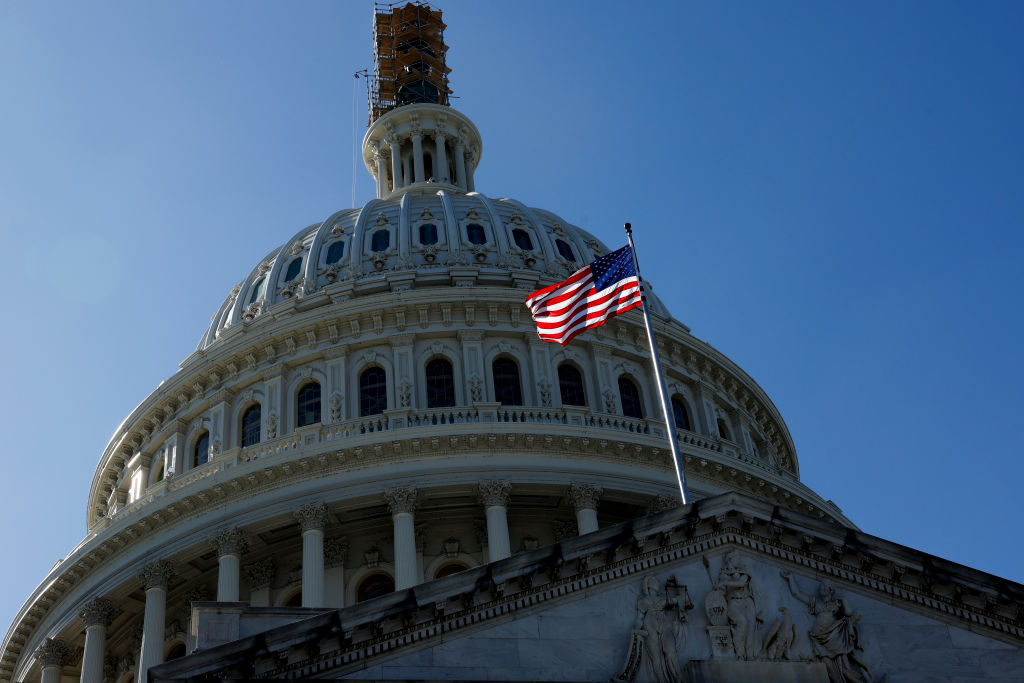Government shutdown avoided as Congress passes temporary funding bill
The bill will fund the government through Nov. 17


A free daily email with the biggest news stories of the day – and the best features from TheWeek.com
You are now subscribed
Your newsletter sign-up was successful
The U.S. Senate voted 88-9 on Saturday to pass a temporary bill to fund the government, avoiding a federal shutdown for the next 47 days. The bill's passage came hours prior to the midnight deadline that would've cut off funding for federal agencies across the country.
The bill was introduced in the House earlier in the day, and passed with bipartisan support in the lower chamber with a 335-91 vote. It will now head to President Biden to be signed into law.
The bill keeps the federal government funded through Nov. 17, and includes additional natural disaster funds for various states, including wildfire-ravaged Hawaii. In notable omissions, there is no additional funding for border security or Ukraine. Some Republicans had objected to giving Ukraine more military aid, and many Democrats were opposed to the border funds.
The Week
Escape your echo chamber. Get the facts behind the news, plus analysis from multiple perspectives.

Sign up for The Week's Free Newsletters
From our morning news briefing to a weekly Good News Newsletter, get the best of The Week delivered directly to your inbox.
From our morning news briefing to a weekly Good News Newsletter, get the best of The Week delivered directly to your inbox.
The stopgap bill marks the temporary end of a contentious period in Congress, particularly in the House, where in-fighting among Republican factions had largely brought negotiations to a standstill. House Speaker Kevin McCarthy (R-Calif.) had attempted to pass a last-minute, partisan stopgap bill to appease the most conservative members of the House GOP, mostly in the far-right House Freedom Caucus. However, the House's far-right bloc voted against the bill on Friday, and it appeared that a shutdown was inevitable.
But in a surprise turnabout Saturday morning, McCarthy was able to get a funding bill to pass. This happened after the speaker "suddenly abandoned demands for steep spending cuts from his right flank and instead relied on Democrats to pass the bill," The Associated Press reported. This could put him at risk of facing a removal vote helmed by his Freedom Caucus opponents.
Congress now has until mid-November to reach a more permanent funding deal, although this will still be "a towering challenge," as noted by NBC News.
A free daily email with the biggest news stories of the day – and the best features from TheWeek.com
Justin Klawans has worked as a staff writer at The Week since 2022. He began his career covering local news before joining Newsweek as a breaking news reporter, where he wrote about politics, national and global affairs, business, crime, sports, film, television and other news. Justin has also freelanced for outlets including Collider and United Press International.
-
 ‘Those rights don’t exist to protect criminals’
‘Those rights don’t exist to protect criminals’Instant Opinion Opinion, comment and editorials of the day
-
 Key Bangladesh election returns old guard to power
Key Bangladesh election returns old guard to powerSpeed Read The Bangladesh Nationalist Party claimed a decisive victory
-
 Judge blocks Hegseth from punishing Kelly over video
Judge blocks Hegseth from punishing Kelly over videoSpeed Read Defense Secretary Pete Hegseth pushed for the senator to be demoted over a video in which he reminds military officials they should refuse illegal orders
-
 ‘Those rights don’t exist to protect criminals’
‘Those rights don’t exist to protect criminals’Instant Opinion Opinion, comment and editorials of the day
-
 ‘The mark’s significance is psychological, if that’
‘The mark’s significance is psychological, if that’Instant Opinion Opinion, comment and editorials of the day
-
 Grand jury rejects charging 6 Democrats for ‘orders’ video
Grand jury rejects charging 6 Democrats for ‘orders’ videoSpeed Read The jury refused to indict Democratic lawmakers for a video in which they urged military members to resist illegal orders
-
 Democrats push for ICE accountability
Democrats push for ICE accountabilityFeature U.S. citizens shot and violently detained by immigration agents testify at Capitol Hill hearing
-
 ‘The West needs people’
‘The West needs people’Instant Opinion Opinion, comment and editorials of the day
-
 ‘The censorious effect is the same, even if deployed covertly’
‘The censorious effect is the same, even if deployed covertly’Instant Opinion Opinion, comment and editorials of the day
-
 Vietnam’s ‘balancing act’ with the US, China and Europe
Vietnam’s ‘balancing act’ with the US, China and EuropeIn the Spotlight Despite decades of ‘steadily improving relations’, Hanoi is still ‘deeply suspicious’ of the US as it tries to ‘diversify’ its options
-
 House ends brief shutdown, tees up ICE showdown
House ends brief shutdown, tees up ICE showdownSpeed Read Numerous Democrats joined most Republicans in voting yes
